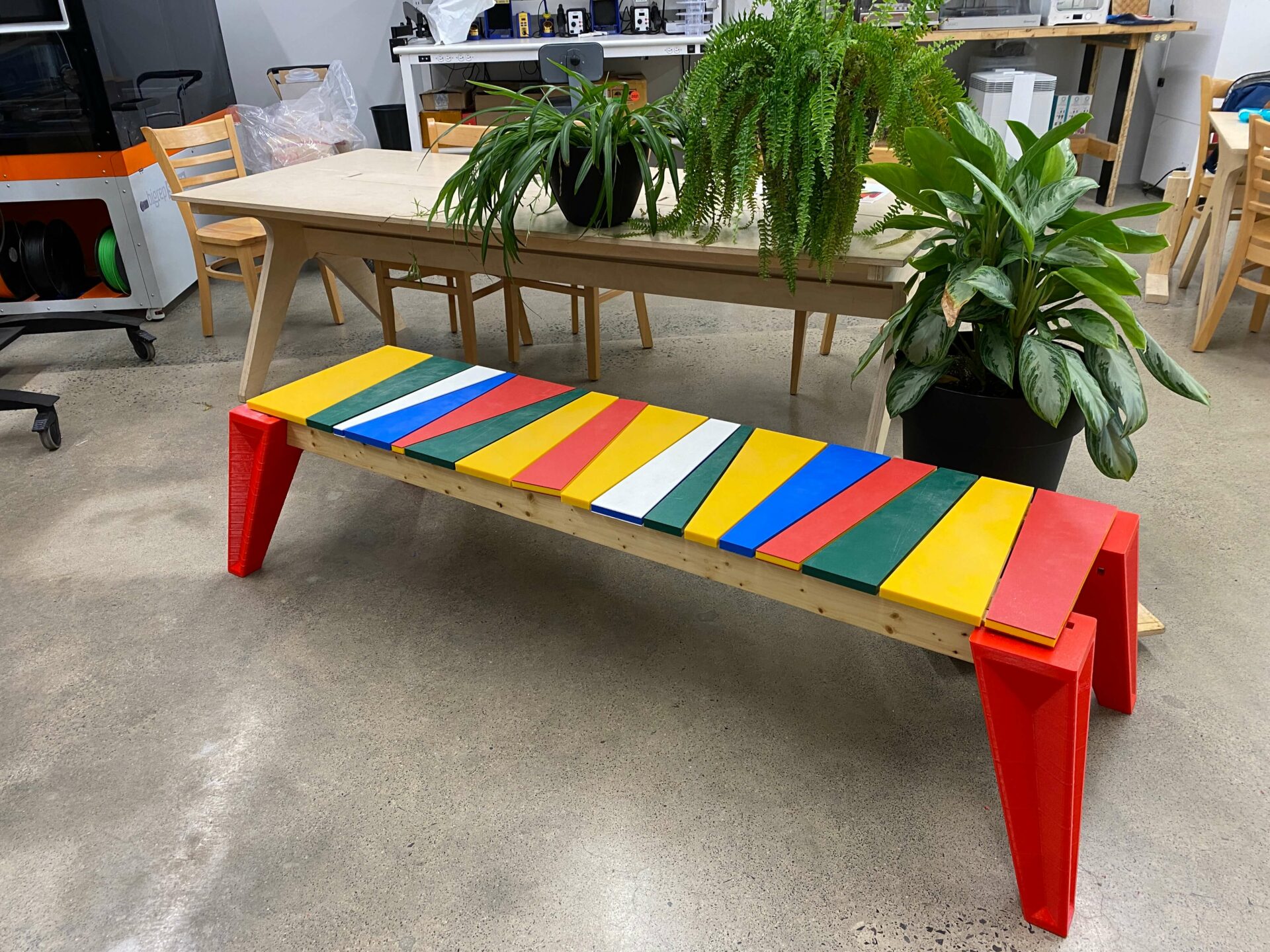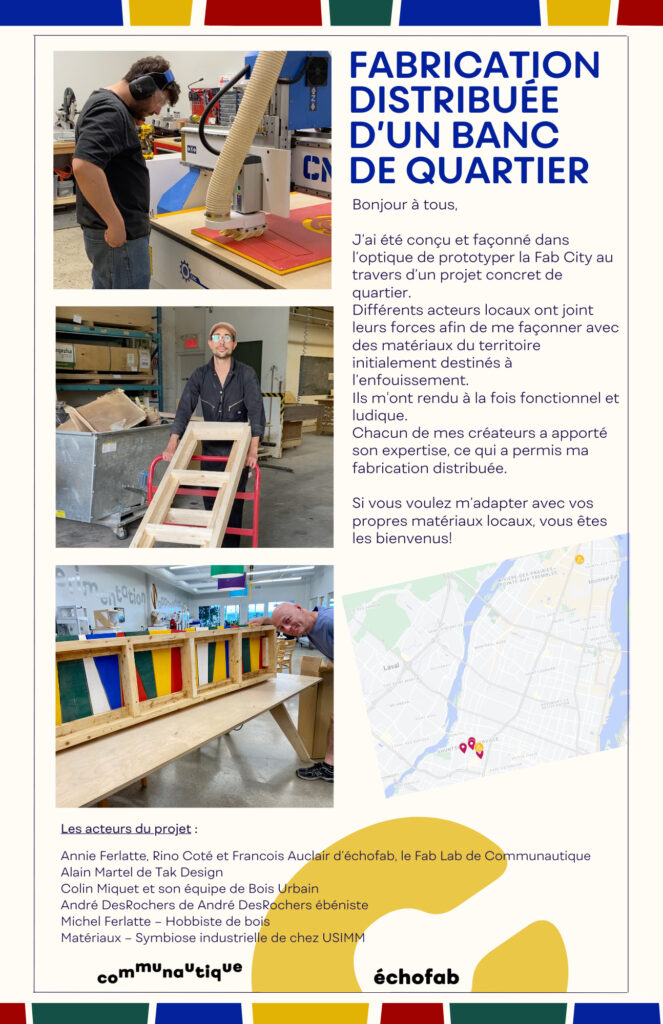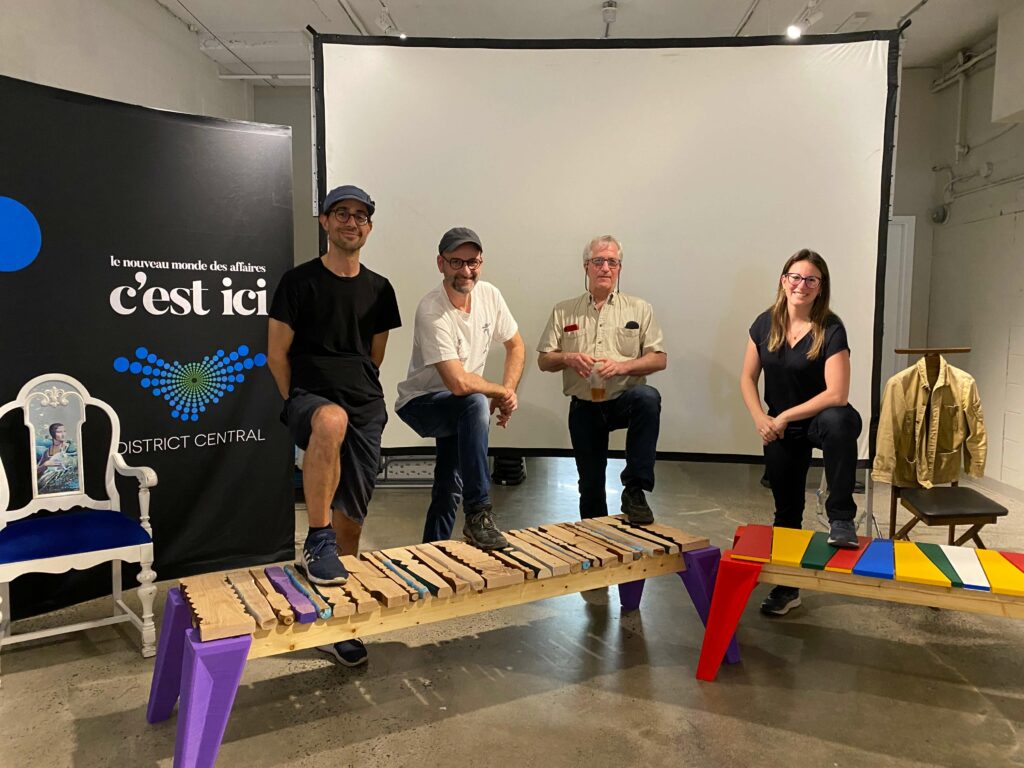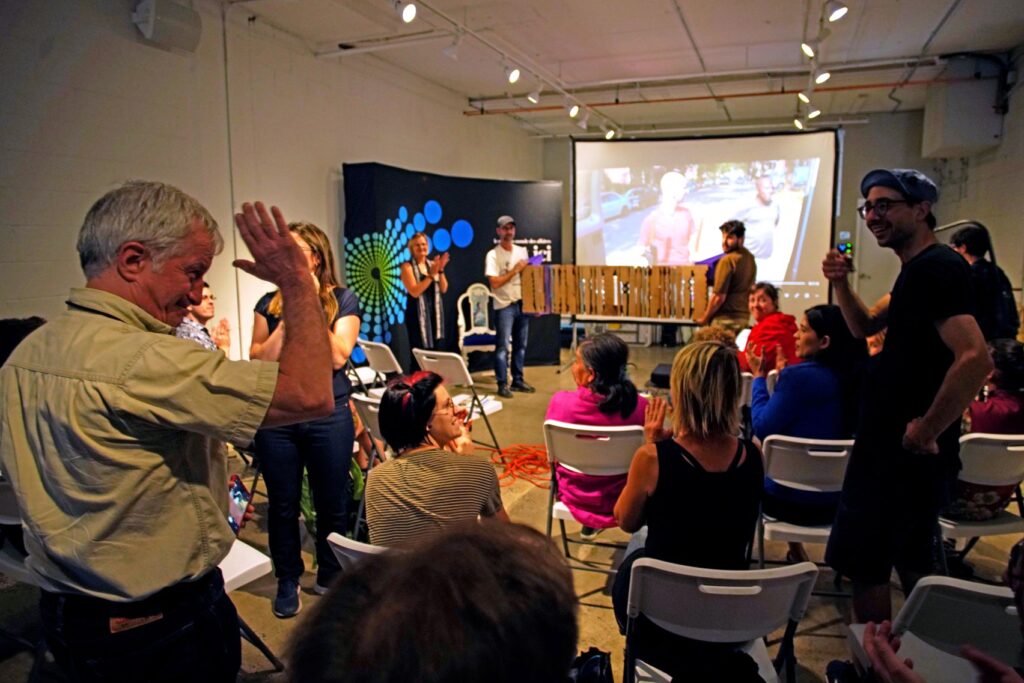Your cart is currently empty!
Distributed production of a neighborhood bench

Project description
A neighborhood bench project as part of Campus Fab City Montréal à la rencontre des Amériques, stemming from the Remix ta chaise initiative, the circular economy and distributed manufacturing between several players in the Central District.
The project wins a Fab City Awards 2023.

Project resources
Plans :
3D models :
coming soon
Project participants
Project participants :
- Annie Ferlatte, Rino Coté, Francois Auclair: froméchofabCommunautique's Fab Lab
- Alain Martel from Tak Design
- Colin Miquet and his Bois Urbain
- André DesRochers from André DesRochers ébéniste
- Michel Ferlatte – Wooden hobbyist
- Materials - Industrial symbiosis from USIMM

An initiative by
echofab, Communautique's multi-disciplinary workshop located in the heart of the Central District, a digital fabrication laboratory (Fab Lab) that brings together forces from several sectors (digital fabrication, education in scientific and technical skills, sustainable development, business support players) to articulate an innovative offering to stimulate the emergence of innovative entrepreneurial projects in the green and digital economy.
Measurable impacts
Ecological
The project aims to raise community awareness of environmental issues, encourage sustainable behavior and promote community involvement in environmental preservation.
The project recovers materials from industrial symbiosis and explores the use of recycled plastic for 3D-printed street furniture.
By reducing waste at source, it helps preserve natural resources. Using recycled materials instead of new raw materials in the manufacture of benches reduces the pressure on natural ecosystems. Recovering recycled materials prevents them from ending up in landfill, and generally requires less energy than creating new materials from scratch. Less energy consumption means fewer greenhouse gas emissions, which can help slow climate change, a factor that can have an impact on biodiversity.
When recycled materials are used to create public benches or other objects, this can contribute to environmental awareness. Communities may be more inclined to preserve natural habitats when their creative use is promoted in a positive way.
The creation of public benches from recycled materials can serve as an example and inspiration for other construction and design projects.
Sustainable development
Spurred on by this initiative, several companies in Montreal's Central District were invited to take part in a collaborative circle focusing on the theme of resource sharing as part of the Fab City Campus event (June 2023). The aim was to establish links and explore opportunities for pooling their respective resources and strengths within the district.
Discussions focused on what resource sharing represents, the issues involved, how it can be deployed, and the potential offered by the concept of microfactories in the context of Fab Labs.
Resource sharing involves multi-faceted exchanges in which the concepts of mutual aid and community play an essential role. This creates an ecosystem in which various stakeholders interact continuously over time. Such collaboration makes it possible to leverage each other's strengths to collectively achieve more. Throughout this process, it becomes possible to generate added value that benefits a greater number of participants.
The next steps in this process will involve drawing up a resource-sharing charter encompassing the shared values and objectives pursued by this initiative, as well as establishing principles defining the collaborative structure.
In addition, the creation of a directory of products, tools, services and human resources precedes the adoption of a digital platform. The Fab City Hamburg platform is currently being studied.
Open source
All phases of this project are carried out in open source mode. They are documented and shared on different platforms, and design and production files are made available.
Distributed manufacturing in open source mode encourages collaboration, cost reduction, accessibility, transparency and efficiency, which can be particularly advantageous for companies seeking to innovate while maximizing the use of their resources and promoting a robust collaborative ecosystem.
The project is widely shared within the Fab Labs and Fab Cities network.
Inclusive
The project involves various stakeholders, including local residents, businesses, designers and artists.
What's more, on a broader scale, our organization is at the forefront of advocating the importance of digital inclusion and the need to reduce the digital divide in the fight against poverty. We are aware of the impact of digitization on senior citizens, the need to improve digital skills and the importance of fair and affordable access to technology. We emphasize the importance of lifelong learning to enable individuals to adapt to the rapid and constant changes of the digital world.
Our organization is also accredited as a Living Lab and develops its initiatives with a co-design approach, including the growth of Fab City Montréal.
Participatory
Throughout all its phases, the project has involved over 130 organizations and citizens who have participated in the various stages of ideation, decision-making and implementation. According to the testimonials received, this brings a sense of empowerment.
The project adopted a participatory approach that enabled the inclusion of a wide range of stakeholders to ensure that decisions and actions met the needs of the community. By involving a large number of organizations and citizens, the project had access to a variety of expertise, resources and skills, enriching both the process and the results. The active participation of citizens and organizations strengthened community ties, fostering a sense of belonging and cooperation.
Glocalization
Chair, bench, stool, utilitarian or symbol of power, with a variety of models and materials, the project's vision led us to imagine that each community, city or territory has a relationship with this object that allows it to adapt to its customs and traditions. .
The project promotes sharing through open documentation and model sharing. When community manufacturing projects are shared globally, different communities have the opportunity to adapt their designs and solutions to local needs and cultures. Sharing experiences and success stories in community benchmaking can lead to collaborative innovations. Cities and territories can improve and customize their initial designs by leveraging shared knowledge.
Beyond being a symbolic object, the project is above all a collective process of distributed manufacturing and a project to raise awareness of sustainable manufacturing.
Locally productive
By involving communities in the manufacture of public benches using locally available resources, it optimizes the use of materials that might otherwise be wasted, contributing to a more efficient allocation of resources. The project encourages community collaboration in the design and production of benches, making the most of locally available skills and talents. This shared approach fosters a sense of ownership and collective responsibility. With a focus on sustainability, the project aligns with the principles of the regenerative economy by reducing waste and promoting the reuse of materials. This approach contributes to building an ecologically sustainable city and territory. As a community initiative, it can stimulate local economic activity by supporting local artisans, manufacturers and businesses involved in the manufacturing process, thus contributing to a more dynamic local economy. The project recognizes the cultural importance of public seating and encourages customization to suit local customs and preferences, creating a city and territory that reflects its unique cultural identity. By sharing its open documentation and models, the project facilitates knowledge sharing between different communities worldwide, enabling them to adapt and replicate successful approaches, thus contributing to a regenerative economy on a larger scale.
Focused on life
The project places communities and individuals at the center of its initiatives, focusing on their needs, preferences and cultural significance. It prioritizes human and community well-being over technological progress. Through its commitment to sustainability and the use of locally available resources, the project demonstrates an ecological approach that prioritizes the well-being of the Earth and its ecosystems. It reduces waste, promotes resource efficiency and contributes to a healthier environment. By involving communities in the design and manufacture of public benches, the project enhances community resilience. It fosters collaboration, strengthens social ties and encourages shared responsibility, which are essential aspects of resilient ecosystems. Although it incorporates technology to some extent (e.g. 3D printing), the project's main focus is on human-centered innovation, ensuring that technology serves the well-being of individuals and communities rather than dominating or eclipsing their needs.
Holistic
The project focuses on sustainability by promoting the use of locally available resources and reducing waste. This contributes to a more sustainable urban environment by optimizing the use of resources. Through community collaboration and the creation of shared public spaces, the project enhances community resilience. It fosters social ties and collective responsibility, which are crucial aspects of building resilient cities. By involving citizens, businesses, designers and artists in the project, it promotes inclusivity and ensures that diverse perspectives and talents are considered in the design and manufacturing process. This inclusiveness contributes to more inclusive cities and territories. he project involves a variety of stakeholders, including citizens and organizations, reflecting an interdisciplinary approach to solving urban problems. This holistic perspective tackles urban problems from a variety of dimensions and interdependencies. Through open documentation and knowledge sharing, the project enables other cities and territories to learn from its experiences and adapt successful practices, thus contributing to the development of sustainable and inclusive urban environments on a wider scale.
